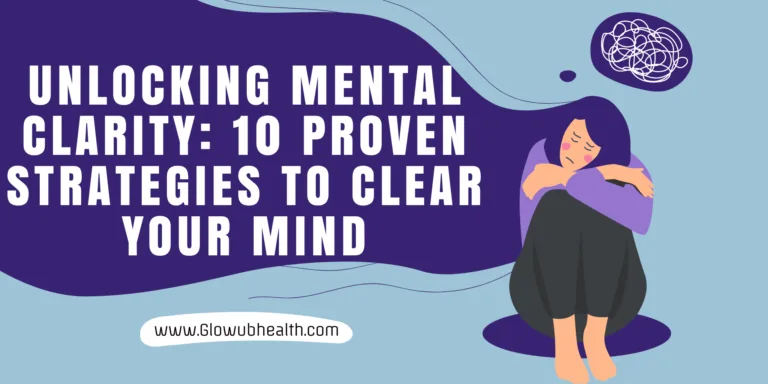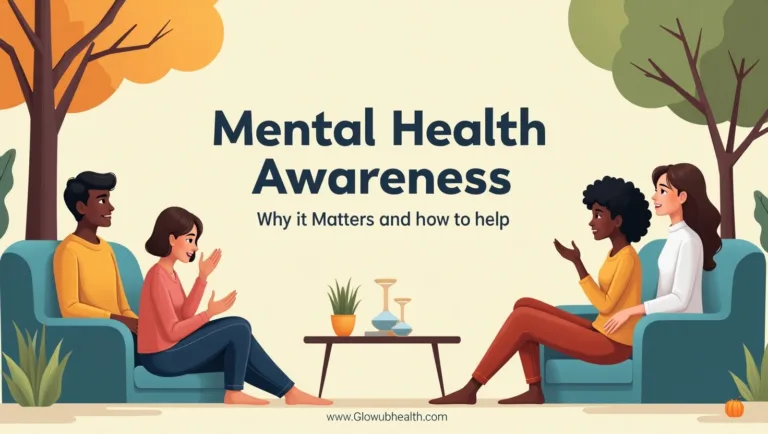Manage Stress : 7 Effective Techniques to Reduce Daily Tension
Does it sometimes feel like stress is just… present? Whether it’s the persistent to-do lists, strict deadlines, or the emotional baggage of day-to-day living — stress can certainly sneak in and hang around longer than it should.
You’re not alone, and you’re definitely not powerless. The good news? You don’t have to turn your life upside down to feel better – in fact, some simple, proven ways can make a real difference in how you cope with stress and maintain your peace of mind.
Here are seven simple and effective ways to manage stress – simple tools you can use today that will help you feel a little more balanced, a little more in control, and a little bit more like yourself.
This content is for informational purposes only and does not constitute medical advice, diagnosis, or treatment. Please consult a qualified healthcare professional if you are experiencing chronic stress or mental health challenges.
1. Practice Mindful Breathing

One of the simplest and most powerful ways to manage stress is through mindful breathing exercises. By focusing on your breath, you can calm your nervous system and reduce feelings of anxiety or overwhelm.
To get started:
- find a quiet space
- sit comfortably, and take slow
- deep breaths in through your nose and out through your mouth.
Focus on the sensation of the air entering and leaving your body.Practicing this for just five minutes a day can make a noticeable difference in how you feel.
2. Incorporate Physical Activity
A natural stress reliever, exercise elevates mood and releases tension that has built up in the body. Physical activity brings about endorphins, which are chemicals that are produced by the brain that are natural painkillers and elevate mood.
Moving simply for the sake of moving can help reduce stress and improve physical and mental well-being; it could be a brisk walk, yoga, or a more strenuous exercise program. Aim for one half hour of exercise nearly everyday, and a lot of benefits can be obtained from the following plan.
3. Prioritize Sleep

Sleep deprivation is commonly one of the biggest sources of stress. When you’re exhausted, the challenges of everyday life can be greater, and you’re less equipped to handle it.
To manage stress, you need to get good quality sleep. This means developing a nice, relaxing sleep routine, no screen time before bed, and a suitable sleep environment.
When you wake up refreshed, you will have the capacity to manage stress, if something comes up! You should aim for 7 to 9 hours of uninterrupted sleep every night!
Read More: Why Do We Sleep? Unraveling the Science Behind a Good Night’s Rest
| Issue | Details |
|---|---|
| Over-reliance on Sleep Aids | Habitual use of sleep medications (like sedatives or sleeping pills) can lead to dependency and tolerance. |
| Interfering with Natural Sleep Cycle | Trying to force sleep or using medications regularly can disrupt the body’s natural sleep rhythm, making it harder to fall asleep naturally. |
| Daytime Drowsiness | Some sleep aids or methods (like over-sleeping during the day) can lead to grogginess and lack of alertness. |
| Potential Side Effects | Sleep medications can have side effects like headaches, dizziness, digestive issues, and even memory problems. |
| Sleep Anxiety | Focusing too much on trying to sleep can increase anxiety, making it harder to relax and fall asleep. |
| Sleep Deprivation Impact | Relying on quick fixes may not address underlying issues, leading to chronic sleep deprivation and worsening insomnia over time. |
| Unhealthy Sleep Patterns | Overcoming insomnia with irregular routines or extreme methods (like excessive napping) can create unhealthy sleep habits. |
| Mental Health Risks | Lack of proper rest over time may negatively impact mood, increasing irritability, stress, or even depression. |
Recent Research on the Critical Role of Prioritizing Sleep for Health
Recent research highlights the importance of prioritizing sleep for overall health. Sleep affects cognitive function, emotional stability, and physical health, with poor sleep linked to conditions like heart disease and diabetes.
Creating an optimal sleep environment, sticking to a routine, and managing stress through relaxation techniques can enhance sleep quality
4. Practice Time Management

Poor time management can lead to a constant feeling of being overwhelmed, which increases stress.
- Learning to manage your time effectively is a key strategy for reducing daily tension.
- Break down large tasks into smaller, manageable steps, and prioritize your to-do list.
- Using tools like calendars, task managers, or even a simple daily planner can help you stay organized and reduce the pressure of looming deadlines, allowing you to manage stress more efficiently.
5. Connect with Others
Social support is a fundamental part of managing stress. When you have a network of friends, family or even coworkers, you have people to talk to when you feel overwhelmed, which can help provide a sense of belonging and emotional release.
When experiencing stress, consider reaching out to someone you trust – like a friend or co-worker – for support. Often, simply verbalizing all of your stressors can help put things in perspective and reduce perceived stress.
If you feel isolated, look for community groups or join organizations to become more involved in activities with the goal of meeting new friends and establishing supportive relationships.
Read More: Foster Healthy Relationships
6. Practice Relaxation Techniques
Relaxation techniques like meditation, progressive muscle relaxation, or guided imagery can be very helpful in stress management.
Relaxation techniques help your body begin to relax, which works against the physical effects of stress, such as increased heart rate and muscle tension.
To implement these best practices, try to engage in one, for 10-15 minutes, per day and you may notice significant improvements in your stress management in six weeks or so.
7. Focus on Nutrition

Food can also affect your approach to stress. Some foods have calming effects that can help regulate your mood.
For example, salmon, walnuts, and flaxseeds have omega-3 fatty acids which may help reduce inflammation and support brain health.
Complex carbohydrates like whole grains provide a steady source of energy and increase production of serotonin (the neurotransmitter that indicates feeling well). If you engage in a healthy, balanced way of eating, then you will feel more prepared day-to-day for dealing with stress.
| Nutrient/Category | Benefits for Stress Management | Examples of Foods |
|---|---|---|
| Omega-3 Fatty Acids | Supports brain health, reduces inflammation, and promotes emotional well-being | Salmon, walnuts, flaxseeds, chia seeds |
| Complex Carbohydrates | Helps regulate blood sugar levels and increases serotonin production, which improves mood | Whole grains (brown rice, oats, quinoa), sweet potatoes |
| Antioxidants | Reduces oxidative stress in the body, protecting cells from damage and improving immune function | Berries, leafy greens, nuts, seeds |
| Magnesium | Relaxes muscles and nerves, helps with sleep, and reduces anxiety | Spinach, almonds, pumpkin seeds, avocados |
| Vitamin C | Supports immune function and lowers the impact of stress hormones like cortisol | Oranges, strawberries, bell peppers, broccoli |
| Probiotics | Improves gut health, which has been linked to better mood and reduced stress | Yogurt, kefir, sauerkraut, kimchi |
| Herbal Teas | Certain teas have calming effects, reducing anxiety and improving sleep quality | Chamomile, green tea, lavender tea |
| Water | Staying hydrated helps maintain energy levels and cognitive function, reducing stress | Water, herbal teas, coconut water |
Conclusion
It’s important to find opportunities to reduce stress in order to promote your health and happiness, especially in today’s hectic world. Though we cannot always eliminate the sources of stress in our busy lives, we can control how we react when challenges arise.
By practicing these seven techniques — from deep breathing exercises to staying active, getting quality sleep, and eating well — you can reclaim some calmness in your life. You’re not looking to eliminate all stress, but you are learning how to work with it, so you can grow, blossom and stay grounded.
You may not believe that small changes can have a wide impact, but they can. Don’t rush take one step at a time and see how these habits impact everyday life.
FAQ
1. What are some effective ways to manage stress?
Effective ways to manage stress include practicing mindfulness, engaging in regular physical activity, prioritizing sleep, using relaxation techniques like meditation, and maintaining a balanced diet.
2. How does exercise help in managing stress?
Exercise helps manage stress by releasing endorphins, which are chemicals in the brain that improve mood and act as natural painkillers. It also reduces muscle tension and improves sleep, both of which contribute to lowering stress levels.
3. Can deep breathing really help manage stress?
Yes, deep breathing can help manage stress by calming the nervous system. Taking slow, controlled breaths activates the parasympathetic nervous system, which helps your body relax and reduces feelings of anxiety.
4. How important is sleep for stress management?
Sleep is essential for managing stress. A lack of sleep makes it harder to cope with daily stressors and can lead to irritability, decreased focus, and increased anxiety. Prioritizing 7-9 hours of sleep helps restore your body and mind.
5. What foods help in managing stress?
Foods rich in omega-3 fatty acids (such as salmon and walnuts), complex carbohydrates (like whole grains), and antioxidants (found in fruits and vegetables) can help manage stress by supporting brain health and promoting balanced energy levels.
6. How can time management reduce stress?
Good time management reduces stress by helping you stay organized and avoid feeling overwhelmed. Breaking tasks into smaller, manageable steps and setting realistic goals can create a sense of control and reduce pressure.
7. Can socializing help manage stress?
Yes, socializing and connecting with others can help manage stress by providing emotional support, perspective, and a sense of belonging. Positive social interactions release oxytocin, a hormone that reduces stress.
8. What role do relaxation techniques play in managing stress?
Relaxation techniques, such as meditation, deep breathing, and progressive muscle relaxation, help manage stress by calming the mind and body. These techniques activate the body’s relaxation response, countering the effects of stress.
9. How can I manage stress at work?
To manage stress at work, take regular breaks, set boundaries, prioritize tasks, and practice stress-relief techniques like deep breathing. Time management and seeking support from colleagues can also be helpful.
10. Can a healthy diet help in stress management?
Yes, a healthy diet plays an important role in managing stress. Nutritious foods provide the energy and nutrients needed to support brain function, maintain mood stability, and reduce the physical effects of stress.



